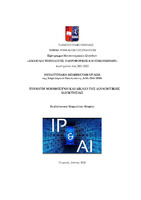Τεχνητή νοημοσύνη και δίκαιο της διανοητικής ιδιοκτησίας

View/
Keywords
Διανοητική ιδιοκτησία ; Τεχνητή νοημοσύνη ; Δίκαιο ευρεσιτεχνίας ; Εμπορικά μυστικά ; Προστασία βάσης δεδομένων ; Εμπορικά σήματαAbstract
Technological innovation is developing rapidly in recent years, with artificial intelligence playing an important role in the automation of processes, without the need of human intervention. The key questions that arise are how to achieve the protection of Al-generated creations with intellectual property framework. The main problems that occur with granting copyright to Al-generated creations are the concept of ‘’originality’’ and ‘’author’’. Ιn addition, in artificial intelligence systems, the Directive 96/9/EC protects the database under copyright law and a sui generis right, resulting in the involvement of many persons in the granting of copyright in these systems. Furthermore, the protection of Al-generated creations under Industrial property, which is one of two subsets of intellectual property is examined. In particular, the protection of Al-generated creations with patents and the patent protection of software is analyzed in detail. Αnother way to protect Al-generated creations is with trade secrets, whilst a comparative overview is made in order to find the most appropriate method of protection between trade secrets and patents. The protection of Al-generated creations with designs presuppose a specialized and deliberate action, while issues with the precise identification of the beneficiary arise from the introduction of numerous requests and data from users into the systems that are available to the public. Μοreover, the protection of Al-generated creations with utility models and trademark law is described. Trademark protection leads to the identification of Al-generated creations in a national and european legal framework. Additionally, special reference is made to the way in which the use of artificial intelligence applications affects the e-commerce. Αrtificial intelligence perceives trademarks with a different way when choosing products and has a high level of memory. Το sum up, the inclusion of Al-generated creations in the public domain is supported with the possibility of reducing the incentive for private companies to invest in the development of artificial intelligence.


